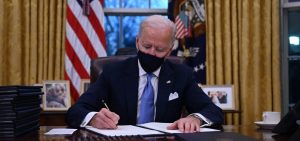News
Trump Administration Had ‘No Plan’ For COVID-19 Vaccine Distribution, Dr. Michael Osterholm Says
By: Robin Young | Samantha Raphelson | Here and Now
Posted on:
WASHINGTON, D.C. (NPR) — On his first full day in office, President Biden is expected to sign more executive orders and directives, including one calling on agencies to use the Defense Production Act to boost supplies of medical equipment, COVID-19 tests and vaccines.

Since then, more than 406,000 people in the country have died of the disease.
Biden is promising to administer 100 million vaccinations in his first 100 days, but the vaccine rollout across the country has been slow. That’s because the Trump administration didn’t have a plan for vaccine distribution, says Osterholm, who also serves as a member of Biden’s coronavirus advisory board.
“There is no plan, or was no plan, by the Trump administration in terms of distribution, how to actually talk to the public about these vaccines and educate [people] about why they’re so important to their health,” he says. “The issue, however, is what can we do going forward? And yesterday, the White House issued a national strategy for COVID-19 response and pandemic preparedness, which has seven major goals, which is the plan that we’ve all been looking for the last year.”
Despite the delay, Osterholm says reaching 100 million vaccinations in 100 days is “doable” and is commending the Biden administration for setting this ambitious goal. Ramping up vaccinations is critical now since we are in the “most dangerous part of the pandemic,” he says.
“I think the next six to 14 weeks could be the darkest days,” he says. “We’ve watched our case numbers basically continue to hit a peak and then come down, hit a peak and then come down. And each time the peaks get higher and each time the coming down doesn’t get nearly as low.”
Right now, the U.S. is reporting 185,000 cases a day, which is already down from 300,000 per day earlier this month, Osterholm says.
But if this new, highly contagious variant of the virus takes off in the U.S., “we could be looking back at a day in the near future where 300,000 cases a day doesn’t seem all that bad,” he says. “That’s a very chilling thought, but I think that’s exactly where we’re at.”
Even if the U.S. does administer 100 million doses of vaccine in 100 days, that will only protect about 14% of the population, Osterholm says. That’s why wearing masks and social distancing remains important, actions Biden is now mandating for employees working in federal buildings.
During his inaugural address Wednesday, Biden called for a moment of prayer to honor the victims of COVID-19. For health care workers on the frontlines of this pandemic like himself, Osterholm says that moment of solemn recognition was very moving.
“We’ve tried to address this pandemic over the course of recent months with vaccine, and it sure makes sense, but we’ve not explored our soul. So yesterday was a recognition of that,” he says. “And it spoke much more loudly than just a virus. It spoke to the very heart and soul of who we are as a country.”
Chris Bentley produced and edited this interview for broadcast with Jill Ryan. Samantha Raphelson adapted it for the web.
This article was originally published on WBUR.org.
9(MDI4ODU1ODA1MDE0ODA3MTMyMDY2MTJiNQ000))


